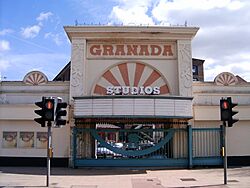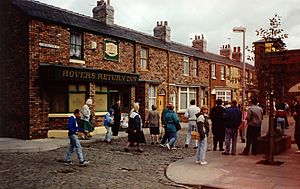Granada Studios Tour facts for kids
 |
|
| Location | Granada Studios, Castlefield, Manchester, England, United Kingdom |
|---|---|
| Coordinates | 53°28′42″N 2°15′27″W / 53.47833°N 2.25750°W |
| Opened | 1988 |
| Closed | 1999 |
| Owner | Granada Parks & Resorts |
The Granada Studios Tour was an exciting theme park in Manchester, England. It was located right next to the Granada Studios building, where many famous TV shows were made. The park was open from 1988 to 1999, letting visitors step into the world of television.
Millions of people visited the Granada Studios Tour. It was a very popular place to explore TV sets and enjoy fun shows. However, by the late 1990s, fewer people were visiting. The park closed to the public in 1999. But don't worry, the famous Coronation Street set, which was a big part of the tour, reopened for a special visit from 2014 to 2015 because so many people wanted to see it!
Contents
History of the Tour
How the Idea Started
The idea for the Granada Studios Tour came from a Granada TV producer named David Plowright. He wanted to use the empty land around the TV studios in Manchester to create something special. His dream was to build a "Hollywood-on-the-Irwell," which meant a place like Hollywood, California, but right by the River Irwell in Manchester.
At first, some people at Granada Group weren't sure about his plan. But David Plowright got support from other important people at Granada Television. A big part of his idea was letting visitors walk down the real Coronation Street set. He also planned to use an old warehouse nearby, which was fixed up for the tour at a cost of £3 million.
Opening Day Success
The Granada Studios Tour opened its doors in July 1988. It was much more popular than anyone expected! Before it opened, experts thought about 250,000 to 275,000 people would visit in the first year. But in just eight months, an amazing 600,000 people had already come to see it!
What You Could See and Do
The outside of the tour looked like a street in New York City, complete with yellow cabs and bright neon signs. This area was actually where the Coronation Street outdoor set used to be filmed before 1982.
The Guided Tour
The guided tour lasted about an hour and took visitors through different TV sets. You could see a recreation of Downing Street, which is where the UK Prime Minister lives. There was also the Sherlock Holmes-era Baker Street set from The Adventures of Sherlock Holmes TV series.
Another cool set was the giant room from The Return of the Antelope. In this room, all the furniture was made much bigger than normal. This made people feel like they were tiny, just like the characters in the show! You could also see the lounge from 'Home Farm' in Emmerdale and the café from Coronation Street.
In the early days, a bus would take visitors through a mock-up of Checkpoint Charlie (a famous border crossing) and then down Baker Street to Coronation Street. Later, the Baker Street set was moved indoors.
Walking Down Coronation Street
The most exciting part of the tour was getting to walk down the actual cobbled street used in Coronation Street since 1982. The tour was closed on Mondays because that was when the TV show was filmed on the set.
Live Shows and Fun
Throughout the day, there were live shows to enjoy. One popular show was a funny play about a political debate in the House of Commons chamber set. This set was so realistic that other TV shows used it too!
Visitors could also grab a drink in a copy of the Rovers Return, the famous pub from Coronation Street. In the cafeteria, there was even a mock-up of the bar from the Woolpack pub in Emmerdale.
Other attractions included a special experience where you could appear in a Coronation Street scene in the Rovers Return. This was done using a special TV trick called chroma key. There was also a ride called MotionMaster, where you sat in moving chairs that matched the action on a big screen. Later, more rides were added, like a single-person monorail called a "Solocoaster" and a 3D film show. The tour also had the shop from the TV show Sooty & Co..
Why the Tour Closed
Decline and Closure
As the 1990s ended, the theme park started to look a bit worn out, and fewer people came to visit. Granada, the company that owned the tour, was going through big changes. The tour was seen as losing money, so plans were made to close it. Many people didn't know this was happening, as they thought the Coronation Street part of the tour was the most important.
Eventually, a new company called 3sixtymedia started using some of the buildings at the tour site for TV production. This meant the tour had to close for good. For a short time before it fully closed, the tour was only open for special groups, like corporate events or fan club visits.
After the Closure
In 2000, some parts of the tour were taken down. This allowed the Coronation Street set to be made bigger and better for filming. They added a new viaduct, a new café called Roy's Rolls, and turned an old club into a new medical centre. After the tour closed, viewers saw the outdoor set much more often in the TV show.
The old Baker Street building was turned into a new studio for Coronation Street, called Stage Two.
There were rumors in 2008 that the tour might reopen, but nothing came of it. In 2012, people tried to get the Coronation Street set and the Granada House building protected as important historical sites, but this request was not approved.
However, as mentioned earlier, the Coronation Street set did reopen to the public for a special period from 2014 to 2015, which was very popular!
Demolition and New Plans
In 2015, plans were made to take down the remaining buildings and structures from the old tour site, including the Coronation Street set and studios. This was to make way for a new neighborhood with workshops, offices, shops, and apartments.
As of 2020, the new outdoor set for Coronation Street is at MediaCityUK and is open to the public for tours.
 | Precious Adams |
 | Lauren Anderson |
 | Janet Collins |


